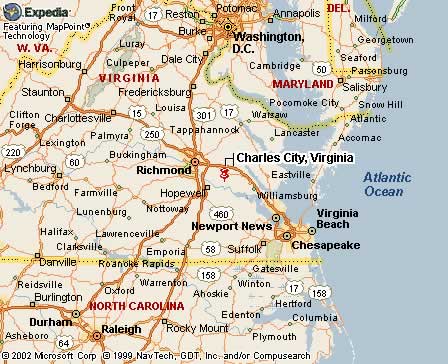|
|
Canku Ota |
|
|
(Many Paths) |
||
|
An Online Newsletter Celebrating Native America |
||
|
November 30, 2002 - Issue 75 |
||
|
|
||
|
State's Tribes Gather to Give Thanks |
||
|
by Elena Gaona Hampton
Roads Daily Press
|
||
|
|
 CHARLES
CITY, VA-- The elders shuffled back to their tables with plates piled
high with roasted venison and succotash, a Chickahominy dish of lentil
beans, corn and tomatoes. Meanwhile, the children giggled and licked
chocolate frosting off plastic forks. CHARLES
CITY, VA-- The elders shuffled back to their tables with plates piled
high with roasted venison and succotash, a Chickahominy dish of lentil
beans, corn and tomatoes. Meanwhile, the children giggled and licked
chocolate frosting off plastic forks. "It's been a happy year," said Gene Adkins, vice president of Virginia Indian Tribal Alliance for Life and a member of the Chickahominy tribe. "We have accomplished a lot this year." The eight state-recognized American Indian tribes of Virginia gathered Saturday evening for a Thanksgiving dinner in which more than 100 young and old broke bread and prayed together inside the Chickahominy Tribal Center in Charles City County. But they were celebrating the accomplishments of all the state tribes, said Upper Mattaponi Chief Ken Adams. "Lately we're all working together a lot," Adams said. Federal recognition is on the horizon for some tribes. Another tribe bought land for a future museum and cultural center. American Indian studies programs are cropping up at Virginia universities. Saturday, the successes were celebrated with special dishes, music and prayer. A Saponi family began the dinner with spiritual drumming that filled the tribal center with reverence. Blessings over the food-laden tables followed, and then it was time to eat. From turkey and cranberries to grilled or roasted venison and persimmons, the warm dishes disappeared quickly. At the tables, the tribe members' conversations ranged from the bountiful food on their plates to the struggles many know still lie ahead. Six of the eight state-recognized tribes have banded together to ask the government for federal recognition that would give them access to health services and scholarship money. They are the Chickahominy, Eastern Chickahominy, Upper Mattaponi, Rappahannock, Nansemond and Monacan Indian Nation. The Mattaponi and Pamunkey have reservations and are not seeking federal recognition. The tribes came close to recognition this year, but must face the House and Senate floors again in January. They expect to gain recognition in 2003, said Mary Wade, president of VITAL. "This country started in Virginia," Wade said, referring to colonists' ships from Europe that arrived in Jamestown in 1607. "The goal of federal recognition is that the descendants of the very first people who met the colonists be recognized as Native Americans." The Eastern Chickahominy are proud of their purchase of 41 acres of land in New Kent for $155,000 this year, said tribal chief Marvin Bradby. But now the tribe must figure out how to pay for the land. So far, pledges from Eastern Chickahominy members have met the payments. Other good news is that American Indian studies programs are growing locally, said United Indians of Virginia Executive Director Melissa Deane. The College of William and Mary has an American Indian Resource Center and Hampton University has an American Indian Gallery in its museum. Virginia Tech in Blacksburg began an American Indians Studies program this year. But American Indian youth still must struggle to make it to universities, said retired Norfolk professor Helen Rountree, who has authored five books on the local tribes. "Education is doubly important when you're a minority and for a tiny minority it's even more important than that," she said. There are 21,172 American Indians in the state - just 0.3 percent of Virginia's population, according to Census 2000 figures. American Indian Thanksgiving dinners always have been a time to give thanks to God for the bounty of summer and to pray for blessings in the winter, said Adkins. The dinner Saturday had an additional meaning. The meal was a fund-raiser sponsored by United Indians of Virginia to boost the organization's educational fund. The fund was too low this year to hand out any scholarships, which have ranged from $500 to $1,200 in past years, said Deane. From four to 30 students have been awarded scholarships for the past 12 years, she said, but the number fell to zero this year. The committee plans to continue fund-raising all year, she said. "Hopefully we'll have some money by fall of next year," Deane said, "in time for the new school year."
|
|
|
||
|
|
||
| Canku Ota is a free Newsletter celebrating Native America, its traditions and accomplishments . We do not provide subscriber or visitor names to anyone. Some articles presented in Canku Ota may contain copyright material. We have received appropriate permissions for republishing any articles. Material appearing here is distributed without profit or monetary gain to those who have expressed an interest. This is in accordance with Title 17 U.S.C. section 107. | ||
|
Canku Ota is a copyright © 2000, 2001, 2002 of Vicki Lockard and Paul Barry. |
||
 |
 |
|
|
The "Canku Ota - A Newsletter Celebrating Native America" web site and its design is the |
||
|
Copyright © 1999, 2000, 2001, 2002 of Paul C. Barry. |
||
|
All Rights Reserved. |
||
